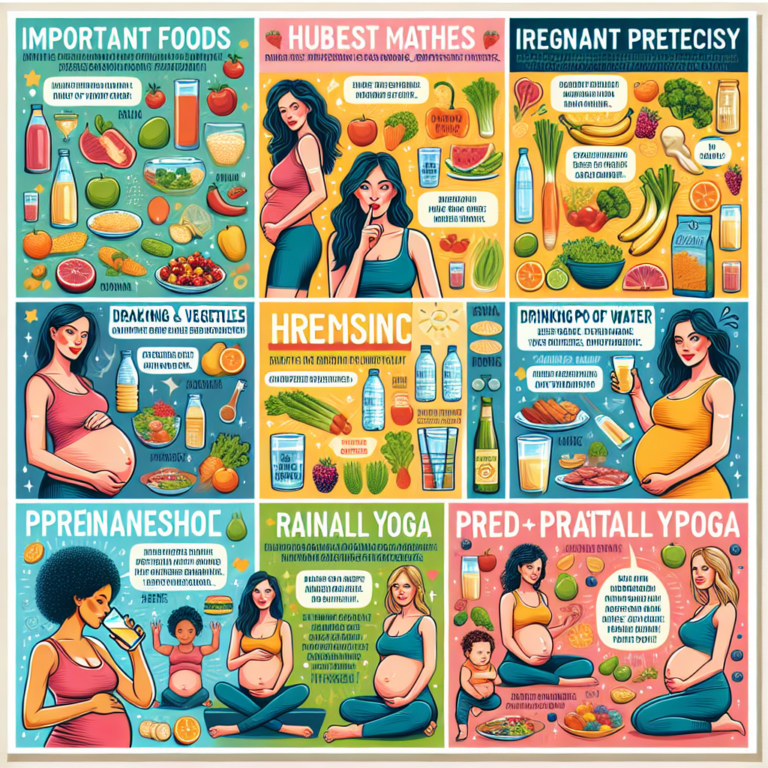Pregnancy is a transformative journey that brings with it a unique set of challenges and joys. As expectant mothers navigate this pivotal stage of life, maintaining a healthy lifestyle becomes paramount for both maternal well-being and fetal development. Adopting positive habits during pregnancy not only enhances the mother’s health but also lays the foundation for a healthier future for the child. In this article, we delve into essential tips for maintaining a healthy lifestyle during pregnancy, offering practical advice to support expectant mothers on their journey. Additionally, we explore the significance of pregnancy nutrition, highlighting key foods and habits that are crucial for the health of both mother and baby. Whether you’re a first-time mom or adding another member to your family, these insights are designed to empower you with the knowledge needed to navigate pregnancy with confidence and vitality.
1. “Essential Tips for Maintaining a Healthy Lifestyle During Pregnancy”
Maintaining a healthy lifestyle during pregnancy is crucial for the well-being of both the mother and the developing baby. Here are some essential tips to ensure you stay healthy and vibrant throughout this transformative journey.
Firstly, nutrition plays a pivotal role in supporting a healthy pregnancy. It’s important to consume a balanced diet rich in essential nutrients. Focus on incorporating a variety of fruits, vegetables, whole grains, lean proteins, and healthy fats into your meals. Foods rich in folic acid, such as leafy greens and fortified cereals, are particularly beneficial as they help prevent neural tube defects. Additionally, staying hydrated by drinking plenty of water is key to maintaining overall health and aiding digestion.
Regular physical activity is another cornerstone of a healthy lifestyle during pregnancy. Engaging in safe, moderate exercise can help alleviate common discomforts such as back pain, improve mood, and promote better sleep. Activities like walking, swimming, or prenatal yoga are excellent options. However, always consult with your healthcare provider before starting or continuing any exercise routine to ensure it’s appropriate for your specific needs.
Getting enough rest is equally important. Pregnancy can be exhausting, so prioritize sleep and relaxation. Aim for at least 7-9 hours of sleep per night and consider short naps during the day if needed. Creating a calming bedtime routine and ensuring your sleeping environment is comfortable can significantly improve sleep quality.
Managing stress is vital for a healthy pregnancy. Practicing mindfulness techniques, such as meditation or deep-breathing exercises, can help maintain emotional balance. Seeking support from loved ones or joining a pregnancy support group can also provide valuable encouragement and advice.
Lastly, regular prenatal care is essential. Attend all scheduled appointments with your healthcare provider to monitor the progress of your pregnancy and address any concerns. These check-ups are crucial for ensuring both you and your baby remain healthy.
By focusing on nutrition, exercise, rest, stress management, and regular prenatal care, you can maintain a healthy lifestyle during pregnancy, paving the way for a positive and fulfilling experience.
 Also Read:
What Is a High-Risk Pregnancy? A Guide to Causes, Symptom...
Also Read:
What Is a High-Risk Pregnancy? A Guide to Causes, Symptom...
2. “Pregnancy Nutrition: Key Foods and Habits for Expectant Mothers”
Maintaining a nutritious diet during pregnancy is essential for the health and well-being of both the expectant mother and the developing baby. A balanced diet can help support the various changes a woman’s body undergoes during pregnancy, while also promoting optimal fetal growth and development. Here are some key foods and habits that should be part of a pregnancy nutrition plan.
Firstly, incorporating a variety of fruits and vegetables is crucial. These provide essential vitamins, minerals, and fiber, which are important for digestion and can help prevent constipation, a common issue during pregnancy. Leafy greens like spinach and kale are particularly beneficial as they are rich in folate, a vital nutrient that helps prevent neural tube defects in the developing fetus.
Whole grains should also be a staple in an expectant mother’s diet. Foods like brown rice, quinoa, and whole grain bread are excellent sources of complex carbohydrates, which supply the energy needed to support increased metabolic demands during pregnancy. They also contain essential nutrients like iron and magnesium, which play key roles in oxygen transport and bone health, respectively.
Protein is another critical component of pregnancy nutrition. Lean meats, poultry, fish, eggs, and plant-based proteins such as beans, lentils, and tofu provide the building blocks necessary for fetal tissue growth and repair. Omega-3 fatty acids, found in fatty fish like salmon and walnuts, are also important for the baby’s brain and eye development.
Calcium-rich foods are essential to support the development of strong bones and teeth in the baby. Dairy products such as milk, cheese, and yogurt, as well as fortified plant-based alternatives, should be included in a balanced pregnancy diet. Additionally, vitamin D, which can be obtained from fortified foods or safe sun exposure, is crucial for calcium absorption.
Hydration is another important aspect of pregnancy nutrition. Expectant mothers should aim to drink plenty of water throughout the day to support increased blood volume and amniotic fluid levels. Proper hydration can also help alleviate common pregnancy symptoms like swelling and fatigue.
In terms of habits, it is beneficial for pregnant women to eat small, frequent meals to maintain energy levels and reduce the risk of nausea or heartburn. It’s also advisable to limit the intake of caffeine and avoid alcohol and certain fish high in mercury, which can be harmful to fetal development.
By focusing on these key foods and habits, expectant mothers can help ensure a healthy pregnancy and support the growth and development of their baby.
